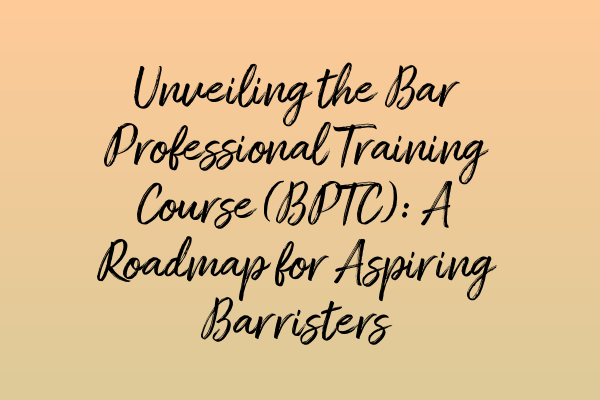Unveiling the Bar Professional Training Course (BPTC): A Roadmap for Aspiring Barristers
Welcome to our comprehensive guide on the Bar Professional Training Course (BPTC), the essential step for anyone aspiring to become a barrister in the UK. In this article, we will take you through everything you need to know about the BPTC, from its purpose and structure to the admission process and career prospects. So, if you have set your sights on a career at the Bar, keep on reading to understand how the BPTC can be your roadmap to success.
The Purpose of the BPTC
The Bar Professional Training Course, commonly known as the BPTC, is a postgraduate qualification designed to equip aspiring barristers with the necessary skills and knowledge to enter the profession. This course is a crucial stepping stone towards fulfilling the requirements of the Solicitors Regulation Authority (SRA) and the Bar Standards Board (BSB).
Through the BPTC, students gain practical experience in advocacy, legal research, drafting, and other essential skills needed to excel in the courtroom. The course focuses on developing strong advocacy skills, professional ethics, and an understanding of the legal system in England and Wales.
While the BPTC is a challenging and competitive course, it provides a comprehensive training program to prepare students for the realities of practicing law. The course curriculum covers a wide range of subjects, including criminal law, civil litigation, evidence, professional ethics, and more.
The Structure of the BPTC
The BPTC is typically a one-year, full-time course, although some institutions offer a part-time option. The course is divided into different modules, each focusing on a specific area of legal practice. These modules include advocacy, conference skills, drafting, opinion writing, and practical legal research.
The main components of the BPTC include:
- Core Skills: This module focuses on developing essential skills such as advocacy, conference skills, legal research, drafting, and opinion writing.
- Optional Modules: Students have the opportunity to choose from a range of optional modules based on their interests and career aspirations. These modules often cover specialized areas of law such as family law, criminal law, commercial law, and more.
- Assessment: The BPTC assessment includes both written and practical examinations to test the students’ understanding of the course material and their ability to apply it in real-life scenarios.
Admission Requirements
To be eligible for the BPTC, aspiring barristers must meet certain admission requirements set by the BSB. These requirements include:
- A qualifying law degree or a degree in a non-law subject followed by a law conversion course (commonly known as the Graduate Diploma in Law or GDL).
- Passing the Bar Course Aptitude Test (BCAT), which assesses critical thinking and reasoning skills.
- Evidence of a good command of the English language, especially if English is not the applicant’s first language.
- Demonstrating the necessary personal qualities and attributes expected of a barrister, such as integrity, resilience, and ethical conduct.
It is important to note that admission to the BPTC is highly competitive, and meeting the minimum requirements does not guarantee a place in the course. Applicants must showcase their academic achievements, relevant work experience, and a genuine passion for pursuing a career at the Bar.
Career Prospects
Successfully completing the BPTC opens up various career opportunities for barristers. Here are a few potential career paths:
- Private Prosecutions: Exploring Non-Governmental Prosecutions in Criminal Cases: A specialized area of criminal law that involves prosecuting individuals or organizations on behalf of private entities.
- Ethical Challenges in Criminal Defence: Navigating Dilemmas: A crucial aspect of criminal law that requires barristers to navigate challenging ethical dilemmas while representing their clients.
- Understanding Drug-related Offences: Laws and Penalties in the UK: Specializing in drug-related offences involves having a deep understanding of the relevant laws and penalties surrounding drug crimes in the UK.
- Magistrates’ Court vs Crown Court: Different Paths in Criminal Proceedings: Exploring the two different paths in criminal proceedings and understanding the roles and responsibilities of barristers in each court.
- Criminal Defence Strategies: Expert Approaches to Protecting Clients’ Interests: Delving into different strategies and approaches barristers can use to effectively protect their clients’ interests in criminal cases.
These are just a few examples, and the field of law is vast, offering barristers the opportunity to specialize in various areas according to their interests and strengths.
Whether you aspire to become a criminal barrister, commercial barrister, family barrister, or pursue any other area of law, the BPTC provides a solid foundation for your legal career.
In Conclusion
The Bar Professional Training Course (BPTC) is a critical step on the path to becoming a barrister. Through comprehensive training in advocacy, legal research, and professional ethics, the BPTC equips students with the essential skills and knowledge required to succeed in the legal profession.
If you aspire to become a barrister, the BPTC can be your roadmap to success. However, it is important to remember that the BPTC is highly competitive, and admission requires meeting specific requirements and demonstrating your aptitude for the profession.
By completing the BPTC, you open up a world of career opportunities. Whether you choose to specialize in criminal law, commercial law, family law, or any other area, the BPTC sets you on the right path to achieving your goals.
So, if you are ready to take on the challenge and embark on an exciting career in law, consider the Bar Professional Training Course as your first step towards becoming a barrister.


Leave a Reply